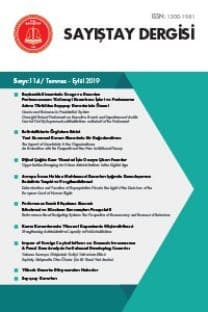SÜREKLİ DENETİM VE DENETİMİN GELECEĞİNE BAKIŞ ÜZERİNE BIST-100 ŞİRKETLERİNDE BİR ARAŞTIRMA
Teknolojide meydana gelen gelişmeler, iş dünyası ve denetim uygulamalarını önemli derecede etkilemiştir. Gitgide daha fazla sayıda kuruluş, finansal raporlarını gerçek zamanlı ve bilgisayar ortamında tutmayı tercih etmektedir. Gerçek zamanlı muhasebe çağında ise denetim sonucunda birçok hata ya da hilenin, gerçekleştikten uzun süre sonra ortaya çıkması, geri dönüşü zor sonuçlara neden olmaktadır. Bu durumu önlemek için kullanılabilecek en iyi yollardan birisi, teknolojinin yoğun olarak kullanıldığı sürekli denetimdir. Sürekli denetim, bağımsız denetçilere, belirlenen denetim konusunun temelini oluşturan olaylar, gerçekleştiği anda ya da kısa bir süre sonrasında, denetim raporlarını kullanarak yazılı güvence vermelerine olanak sağlayan bir yöntemdir.Bu çalışmanın amacı; sürekli denetim ve denetimin geleceği hakkında denetçilerin bakış açılarını sunmaktır. Bu amaçla, öncelikle sürekli denetim kavramı ve bu yaklaşımın ortaya çıkmasını sağlayan nedenlerden bahsedilmiştir. Ardından BIST-100 şirketlerinde sürekli denetim ve denetimin geleceği hakkında yapılan anket uygulaması sonuçları sunulmuştur Sonuç olarak denetçilerin sürekli denetime oldukça olumlu baktıkları ve denetimin gelecekte bu yönde gelişeceğini düşündükleri söylenebilir. Bununla birlikte denetçilerin, her ne kadar teknoloji denetimi etkin hale getirip kolaylaştırsa da yine sorumluluğun kendilerinde olacağını düşündükleri ifade edilebilir
Anahtar Kelimeler:
Sürekli Denetim, Denetim, Teknolojik Araçlar
A STUDY ON BIST-100 FIRMS WITH RESPECT TO CONTINUOUS AUDITING AND THE FUTURE OF AUDITING
Technological advances have significantly altered the business world and the audit practices. An increasing number of entities prefer keeping their financial reports real-timely in the computer environment. In the age of real time accounting, the revealing of many errors or fraud in audits a very long time after the audit took place leads to irreversible Bu makale “İç Denetim Stratejisinde Sürekli Denetim Yaklaşımı BIST-100 Şirketlerinde Bir Araştırma” adlı doktora tezinden türetilmiştir.* Başlıca Yazar, Yrd. Doç. Dr., Giresun Üniversitesi, İİBF, İşletme Bölümü, muratsercemeli@gmail.com** Prof. Dr., Atatürk Üniversitesi, İİBF, İşletme Bölümü, msuphi@atauni.edu.trresults. One of the methods to be used to prevent such situations is continuous auditing where technology is intensively used. Continuous auditing is a method that enables independent auditors to provide assurance on a subject matter using a series of auditor reports issued simultaneously with or within a short period of time following the occurrence of the events underlying the subject matter.The purpose of this study is to present the viewpoints of auditors on the continuous auditing and future of auditing. To this end, first the concept of continuous auditing and the reasons paving the way for its emergence will be mentioned and then the results of questionnaire applied on BIST-100 firms with respect to continuous auditing and future of auditing will be presented. As a conclusion, it can be stated that auditors think quite positively about continuous auditing and expressed that auditing will progress in this direction in the future. Another finding is that auditors think that they will continue bearing the responsibility although technology activates and facilitates auditing
Keywords:
Continuous Auditing, Auditing, Technological tools,
___
- Bibi, Wa’el F. (2010), “Continuous Auditing: The Basics, Reality and the Future”, http://www.bibiconsulting.net/Continuous_audit_Article.pdf,(Erişim Tarihi: 29.06.2014).
- Brown, Carol E., Jeffrey A. Wong ve Amelia A. Baldwin (2007), “A Review and Analysis of the Existing Research Streams in Continuous Auditing”, Journal of Emerging Technologies in Accounting, 4(1), 1-28.
- Elliott, Robert K. (2002), “Twenty-First Century Assurance”, Auditing: A Journal of Practice & Theory, 21(1), 139-146.
- Harrison, R. (2005), “Embracing Compliance with Continuous Online Auditing”, Sarbanes Oxley Compliance Journal.
- Hunton, J, Wright, A, Wright, S. (2003), “Assessing the Impact of More Frequent External Financial Statement Reporting and Independent Auditor Assurance on Quality of Earnings and Stock Market Effects”, Paper Presented at the Fifth Continuous Auditing Symposium, Rutgers University.
- Kogan, Alexander, Ephraim F. Sudit, ve Miklos A. Vasarhelyi (1999), “Continuous Online Auditing; A Programme of Research”, Journal of Information Systems, 13(2).
- Krass, Peter (2002), “The Never-Ending Audit: Can Software Prevent Future Enrons?”, CFO Magazine.
- Means, G., Warren Jr, J. (2005), “Continuous Financial Controls Review Processes (CFCRP): Using Powerful New Technologies May be the Only Real Answer to the Demands of Sarbanes-Oxley”, Sarbanes Oxley Compliance Journal— Financial Market Solutions.
- Orhan, Mehmet S., Murat Serçemeli (2015), “İç Denetim Stratejisinde Sürekli Denetimin Uygulanabilirliğine İlişkin Bir Araştırma”, Giresun Üniversitesi İktisadi ve İdari Bilimler Dergisi, 1(2), 83-110.
- Özgeneci, Aylin (2007), “Denetim Çalışmalarında Teknoloji - Veri Analizi”, http://www.denetimnet.net/UserFiles/Documents/DeloitteMakaleleri/ CAAT_Makale.pdf. (Erişim Tarihi: 10.08.2014).
- Özdamar, K. (2011), Paket Programlar İle İstatistiksel Veri Analizi (8.Baskı). Eskişehir: Kaan Kitabevi.
- Rezaee, Zabihollah, Ahmad Sharbatoglie, Rick Elam, Peter L. McMickle (2002), “Continuous Auditing Building Automated Auditing Capability”, Auditing: A journal of Practice & Theory, 21(1), 147-163.
- Tamay, Göktürk (2010), “Sürekli Denetim Sürekli Gözetim”, KPM Gündem Risk Yönetimi ve Uyum Hizmetleri Özel Sayısı, Temmuz-Eylül, 14-15.
- Vasarhelyi, Miklos, ve Marilyn Greenstein (2003), “Underlying Principles of the Electronization of Business: A Research Agenda”, International Journal of Accounting Information Systems, 4(1), 1-25.
- Vasarhelyi, Miklos A., Michael G. Alles, ve Alexander Kogan (2004), “Principles of Analytic Monitoring for Continuous Assurance”, Journal of Emerging Technologies in Accounting, 1(1), 1-21.
- Warren, J. Donald, Xenia Ley Parker (2003), “Continuous Auditing: Potential for Internal Auditing”, USA: The Institute of Internal Auditors Research Foundation.
- White, Larry (2005), “Does Internal Control Enhance or Impede”, Strategic Finance, 86(8), 6-7.
- ISSN: 1300-1981
- Yayın Aralığı: Yılda 4 Sayı
- Başlangıç: 1990
- Yayıncı: T.C. Sayıştay Başkanlığı
Sayıdaki Diğer Makaleler
Nisan - Haziran 2016 - Sayı 101 Tamamı
Ulusal Hakemli DERGİ, Fikret ÇÖKER, Başkan YARDIMCISI, Necip TOSUN, Melek Şanal DEMİRKAN, Necip Tosun Uzman DENETÇİ, Zekeriya Aslan Uzman DENETÇİ, Ahmet Taner Uzman DENETÇİ, Melek Şanal Demirkan BAŞDENETÇİ, Filiz Köroğlu Aydınlı BAŞDENETÇİ, Berna Erkan BAŞDENETÇİ, Mehmet Balioğlu BAŞDENETÇİ, Mehmet Gökmağara DE
SÜREKLİ DENETİM VE DENETİMİN GELECEĞİNE BAKIŞ ÜZERİNE BIST-100 ŞİRKETLERİNDE BİR ARAŞTIRMA
Murat SERÇEMELİ, M Suphi ORHAN
KAMU PERSONEL REJİMİNDE ESNEKLİĞİN BİR YANSIMASI: SAVUNMA SANAYİİ MÜSTEŞARLIĞI PERSONEL REJİMİ
İş Yerinde Karanlık Üçlü: Bir Kamu Kuruluşunun İç Denetim Biriminde Araştırma
